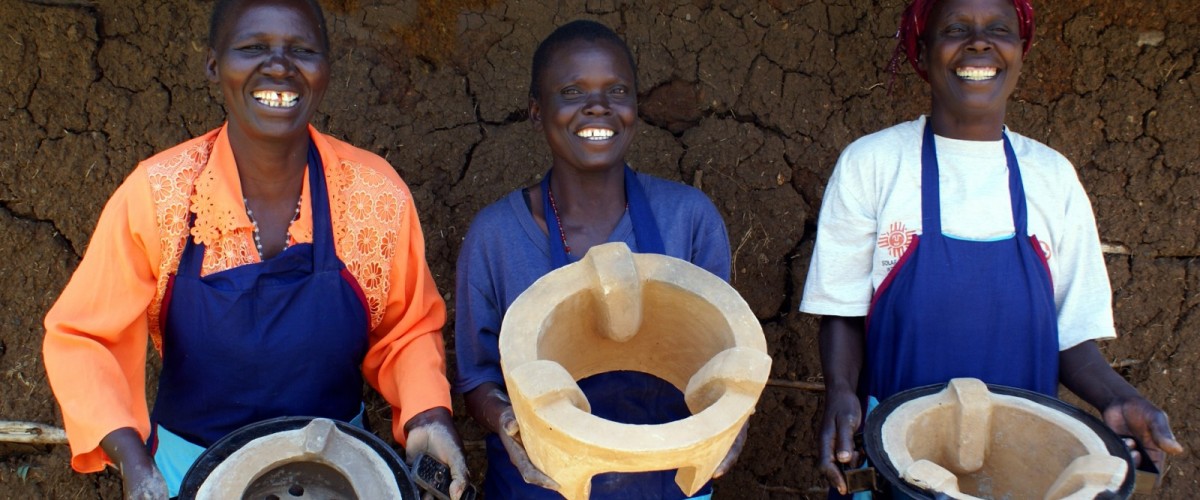A single mother of three, Margaret Kariuki used to sell milk to earn a living in Lanet Umoja in Nakuru county of Kenya. Now she runs a successful briquette business, thanks to training and mentorship from Practical Action.
Practical Action Eastern Africa, in partnership with Sustainable Community Development Services (SCODE) is implementing the Women in Energy Enterprises in Kenya (WEEK) project to build and expand businesses in three renewable energy markets: improved cookstoves, solar products, and biomass briquettes.
The overall objective is to strengthen women’s capacity to effectively participate in and benefit from energy markets. The project uses an enterprise development model to empower women economically and provides tailor-made support to women entrepreneurs in market assessment. It also seeks to expand and strengthen entrepreneurial associations for business owners to provide additional support.
When Ms. Kariuki started her business, she did so without a business plan. She understood basic concepts about bookkeeping, though product promotion and marketing were entirely new to her.
“I started with a capital of 200 shillings and I was able to produce 90 kilograms of briquettes”, Ms. Kariuki told us. “Even so, I did not reach positive cash flow until Practical Action sent mentors who provided technical and business skills training. They advised me on good marketing approaches, and how to ensure a minimum quality standard for my briquettes.”
One of her greatest challenges was convincing people to use briquettes; many people in Lanet were used to charcoal, and were not willing to try out the new product. Ms. Kariuki applied some of the strategies she learned during her training, and began providing target customers with free samples.
“After about one month, I began receiving positive feedback from customers, and my sales doubled!”, Ms. Kariuki said. “The training I received from Practical Action, and specifically the guidance I received from mentors, was really helpful in growing my business. Their support has made a big difference in my financial life.”
![PracticalAction_ENERGIA2015_142-300x200[1]](http://energia.org/assets/2016/02/PracticalAction_ENERGIA2015_142-300x2001-1-300x200.jpg) Ms. Kariuki is one of the many WEEK project success stories. Before it is completed, the project aims to reach 730 small-scale women energy entrepreneurs (MSEs), who will in turn reach 364,200 beneficiaries, including women, men, children, and institutions in need. The entrepreneurs will provide their communities with cleaner energy technologies and options, and contribute to environmental preservation in the project areas. In addition, as their businesses grow, an additional 450 men and women will be employed by the women entrepreneurs in rural and peri-urban areas across seven counties in the country. So far, 675 women have been recruited under the WEEK project and are receiving technology and business mentorship. Each entrepreneur is linked to a technology mentor and a business mentor to heighten the potential of success.
Ms. Kariuki is one of the many WEEK project success stories. Before it is completed, the project aims to reach 730 small-scale women energy entrepreneurs (MSEs), who will in turn reach 364,200 beneficiaries, including women, men, children, and institutions in need. The entrepreneurs will provide their communities with cleaner energy technologies and options, and contribute to environmental preservation in the project areas. In addition, as their businesses grow, an additional 450 men and women will be employed by the women entrepreneurs in rural and peri-urban areas across seven counties in the country. So far, 675 women have been recruited under the WEEK project and are receiving technology and business mentorship. Each entrepreneur is linked to a technology mentor and a business mentor to heighten the potential of success.
In addition, Practical Action and SCODE also lobby for adoption of women’s economic empowerment approaches to deliver new targets for universal modern energy access nationally, regionally and internationally. Specifically, they work with the Ministry of Energy & Petroleum in Kenya to ensure gender and decentralized energy systems remain central to Kenya’s SE4All Action Plans. They are working with ENERGIA-Kenya CSO partners, the government, donors, private sector and the media to mainstream gender in regional and national energy plans and investments. Finally, through their national gender and energy outreach campaign, they aim to reach 2 million people. Through all of this, they hope to ensure that energy advocates include gender-aware approaches to their energy access projects.







